ARUL's Climate Change Mitigation: Evaluating Policy Options
VerifiedAdded on 2023/01/09
|8
|2047
|26
Report
AI Summary
This report addresses ARUL's environmental impact and proposes strategies to reduce its carbon footprint, given limited funding. The report evaluates three potential solutions: implementing solar energy, incentivizing e-bikes, and transitioning to a paperless office. While solar energy and e-bikes are considered, they are not recommended due to high initial costs, weather dependency, and limited user adoption. The report strongly recommends adopting a paperless office approach. The report highlights the benefits of a paperless system, including reduced paper consumption, cost savings, enhanced data safety, and improved efficiency. The report also notes that digitalization supports mobile workforces, making it the most effective and sustainable option for ARUL to improve its environmental impact.

Professional Communication
Paraphrase This Document
Need a fresh take? Get an instant paraphrase of this document with our AI Paraphraser
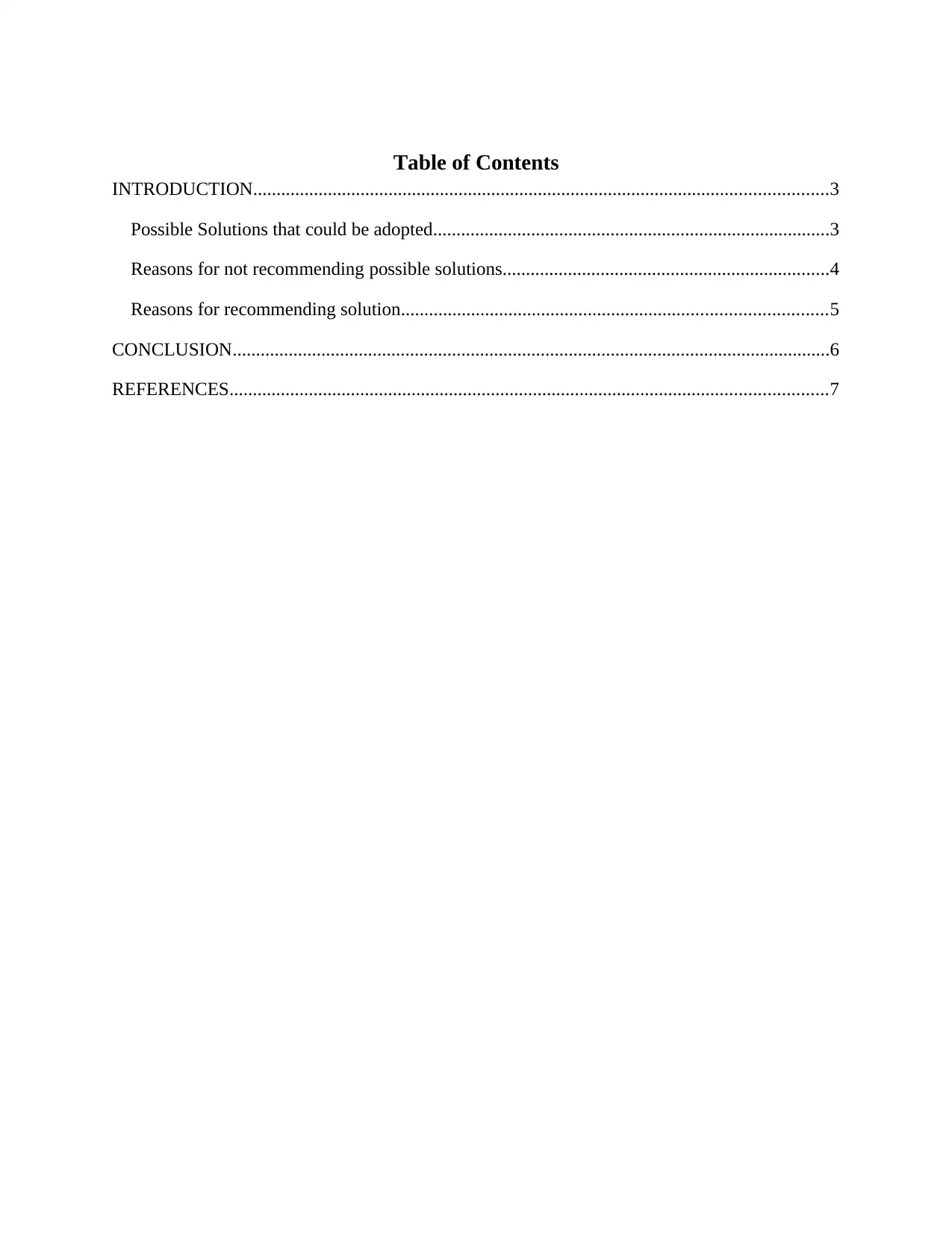
Table of Contents
INTRODUCTION...........................................................................................................................3
Possible Solutions that could be adopted.....................................................................................3
Reasons for not recommending possible solutions......................................................................4
Reasons for recommending solution...........................................................................................5
CONCLUSION................................................................................................................................6
REFERENCES................................................................................................................................7
INTRODUCTION...........................................................................................................................3
Possible Solutions that could be adopted.....................................................................................3
Reasons for not recommending possible solutions......................................................................4
Reasons for recommending solution...........................................................................................5
CONCLUSION................................................................................................................................6
REFERENCES................................................................................................................................7
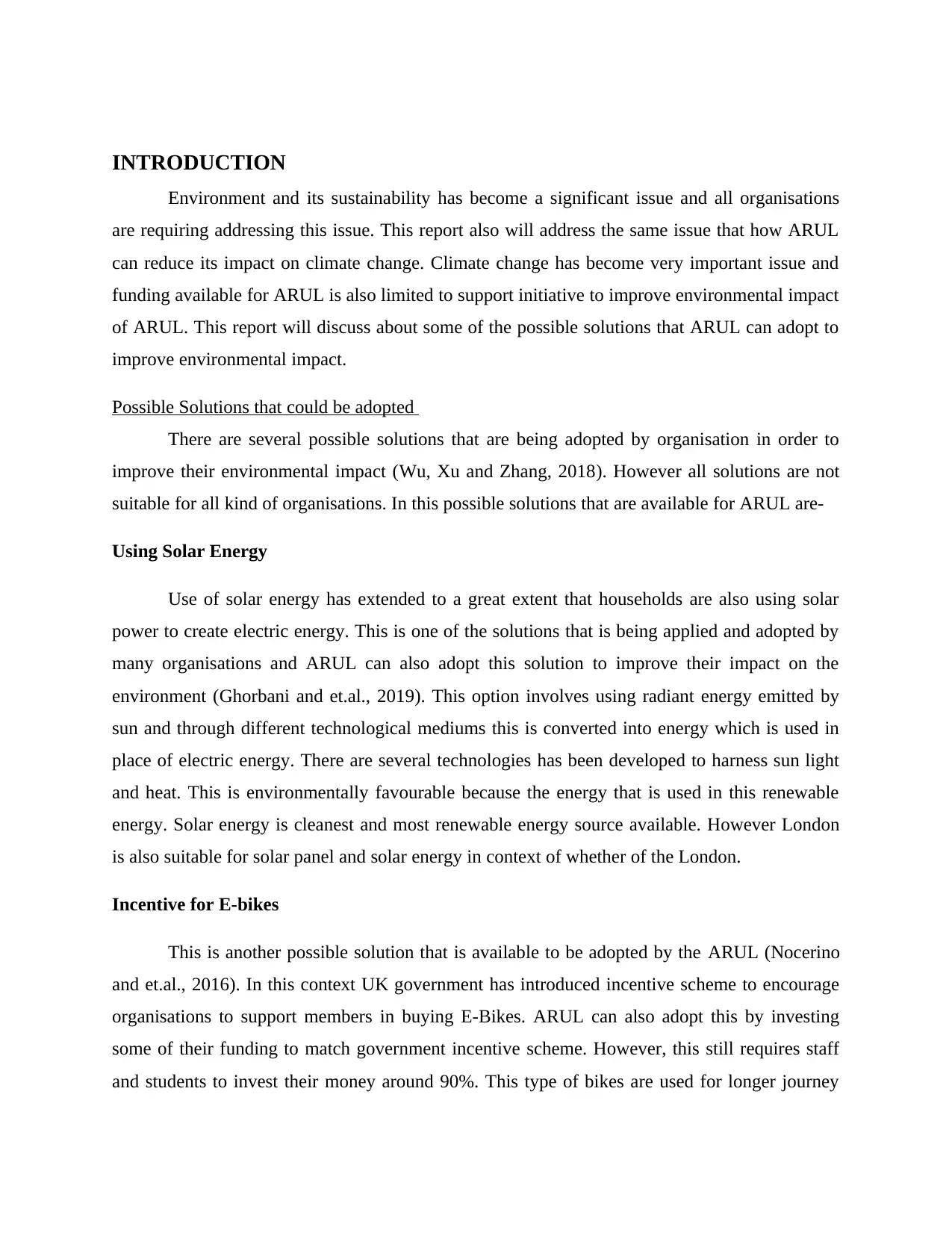
INTRODUCTION
Environment and its sustainability has become a significant issue and all organisations
are requiring addressing this issue. This report also will address the same issue that how ARUL
can reduce its impact on climate change. Climate change has become very important issue and
funding available for ARUL is also limited to support initiative to improve environmental impact
of ARUL. This report will discuss about some of the possible solutions that ARUL can adopt to
improve environmental impact.
Possible Solutions that could be adopted
There are several possible solutions that are being adopted by organisation in order to
improve their environmental impact (Wu, Xu and Zhang, 2018). However all solutions are not
suitable for all kind of organisations. In this possible solutions that are available for ARUL are-
Using Solar Energy
Use of solar energy has extended to a great extent that households are also using solar
power to create electric energy. This is one of the solutions that is being applied and adopted by
many organisations and ARUL can also adopt this solution to improve their impact on the
environment (Ghorbani and et.al., 2019). This option involves using radiant energy emitted by
sun and through different technological mediums this is converted into energy which is used in
place of electric energy. There are several technologies has been developed to harness sun light
and heat. This is environmentally favourable because the energy that is used in this renewable
energy. Solar energy is cleanest and most renewable energy source available. However London
is also suitable for solar panel and solar energy in context of whether of the London.
Incentive for E-bikes
This is another possible solution that is available to be adopted by the ARUL (Nocerino
and et.al., 2016). In this context UK government has introduced incentive scheme to encourage
organisations to support members in buying E-Bikes. ARUL can also adopt this by investing
some of their funding to match government incentive scheme. However, this still requires staff
and students to invest their money around 90%. This type of bikes are used for longer journey
Environment and its sustainability has become a significant issue and all organisations
are requiring addressing this issue. This report also will address the same issue that how ARUL
can reduce its impact on climate change. Climate change has become very important issue and
funding available for ARUL is also limited to support initiative to improve environmental impact
of ARUL. This report will discuss about some of the possible solutions that ARUL can adopt to
improve environmental impact.
Possible Solutions that could be adopted
There are several possible solutions that are being adopted by organisation in order to
improve their environmental impact (Wu, Xu and Zhang, 2018). However all solutions are not
suitable for all kind of organisations. In this possible solutions that are available for ARUL are-
Using Solar Energy
Use of solar energy has extended to a great extent that households are also using solar
power to create electric energy. This is one of the solutions that is being applied and adopted by
many organisations and ARUL can also adopt this solution to improve their impact on the
environment (Ghorbani and et.al., 2019). This option involves using radiant energy emitted by
sun and through different technological mediums this is converted into energy which is used in
place of electric energy. There are several technologies has been developed to harness sun light
and heat. This is environmentally favourable because the energy that is used in this renewable
energy. Solar energy is cleanest and most renewable energy source available. However London
is also suitable for solar panel and solar energy in context of whether of the London.
Incentive for E-bikes
This is another possible solution that is available to be adopted by the ARUL (Nocerino
and et.al., 2016). In this context UK government has introduced incentive scheme to encourage
organisations to support members in buying E-Bikes. ARUL can also adopt this by investing
some of their funding to match government incentive scheme. However, this still requires staff
and students to invest their money around 90%. This type of bikes are used for longer journey
⊘ This is a preview!⊘
Do you want full access?
Subscribe today to unlock all pages.

Trusted by 1+ million students worldwide
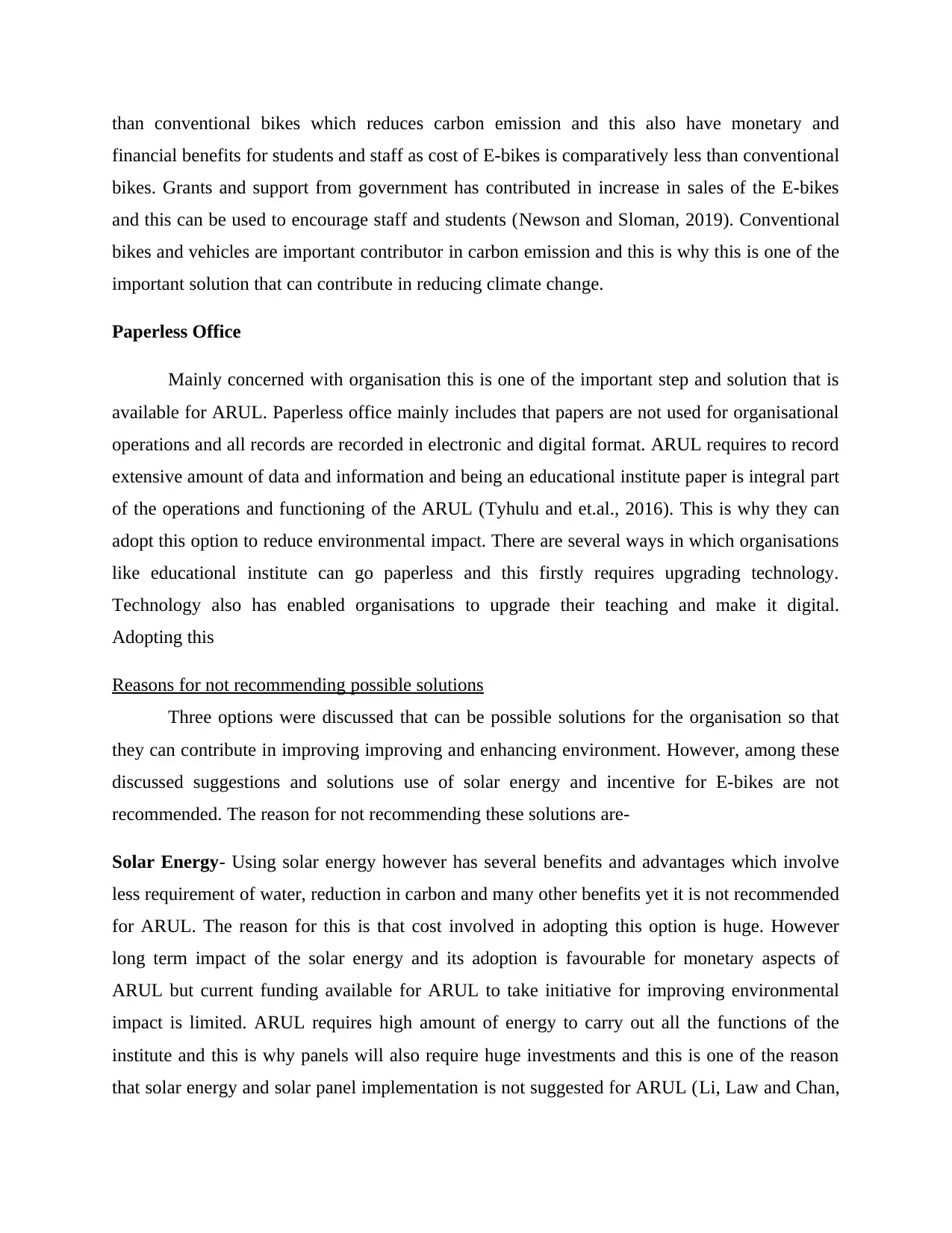
than conventional bikes which reduces carbon emission and this also have monetary and
financial benefits for students and staff as cost of E-bikes is comparatively less than conventional
bikes. Grants and support from government has contributed in increase in sales of the E-bikes
and this can be used to encourage staff and students (Newson and Sloman, 2019). Conventional
bikes and vehicles are important contributor in carbon emission and this is why this is one of the
important solution that can contribute in reducing climate change.
Paperless Office
Mainly concerned with organisation this is one of the important step and solution that is
available for ARUL. Paperless office mainly includes that papers are not used for organisational
operations and all records are recorded in electronic and digital format. ARUL requires to record
extensive amount of data and information and being an educational institute paper is integral part
of the operations and functioning of the ARUL (Tyhulu and et.al., 2016). This is why they can
adopt this option to reduce environmental impact. There are several ways in which organisations
like educational institute can go paperless and this firstly requires upgrading technology.
Technology also has enabled organisations to upgrade their teaching and make it digital.
Adopting this
Reasons for not recommending possible solutions
Three options were discussed that can be possible solutions for the organisation so that
they can contribute in improving improving and enhancing environment. However, among these
discussed suggestions and solutions use of solar energy and incentive for E-bikes are not
recommended. The reason for not recommending these solutions are-
Solar Energy- Using solar energy however has several benefits and advantages which involve
less requirement of water, reduction in carbon and many other benefits yet it is not recommended
for ARUL. The reason for this is that cost involved in adopting this option is huge. However
long term impact of the solar energy and its adoption is favourable for monetary aspects of
ARUL but current funding available for ARUL to take initiative for improving environmental
impact is limited. ARUL requires high amount of energy to carry out all the functions of the
institute and this is why panels will also require huge investments and this is one of the reason
that solar energy and solar panel implementation is not suggested for ARUL (Li, Law and Chan,
financial benefits for students and staff as cost of E-bikes is comparatively less than conventional
bikes. Grants and support from government has contributed in increase in sales of the E-bikes
and this can be used to encourage staff and students (Newson and Sloman, 2019). Conventional
bikes and vehicles are important contributor in carbon emission and this is why this is one of the
important solution that can contribute in reducing climate change.
Paperless Office
Mainly concerned with organisation this is one of the important step and solution that is
available for ARUL. Paperless office mainly includes that papers are not used for organisational
operations and all records are recorded in electronic and digital format. ARUL requires to record
extensive amount of data and information and being an educational institute paper is integral part
of the operations and functioning of the ARUL (Tyhulu and et.al., 2016). This is why they can
adopt this option to reduce environmental impact. There are several ways in which organisations
like educational institute can go paperless and this firstly requires upgrading technology.
Technology also has enabled organisations to upgrade their teaching and make it digital.
Adopting this
Reasons for not recommending possible solutions
Three options were discussed that can be possible solutions for the organisation so that
they can contribute in improving improving and enhancing environment. However, among these
discussed suggestions and solutions use of solar energy and incentive for E-bikes are not
recommended. The reason for not recommending these solutions are-
Solar Energy- Using solar energy however has several benefits and advantages which involve
less requirement of water, reduction in carbon and many other benefits yet it is not recommended
for ARUL. The reason for this is that cost involved in adopting this option is huge. However
long term impact of the solar energy and its adoption is favourable for monetary aspects of
ARUL but current funding available for ARUL to take initiative for improving environmental
impact is limited. ARUL requires high amount of energy to carry out all the functions of the
institute and this is why panels will also require huge investments and this is one of the reason
that solar energy and solar panel implementation is not suggested for ARUL (Li, Law and Chan,
Paraphrase This Document
Need a fresh take? Get an instant paraphrase of this document with our AI Paraphraser
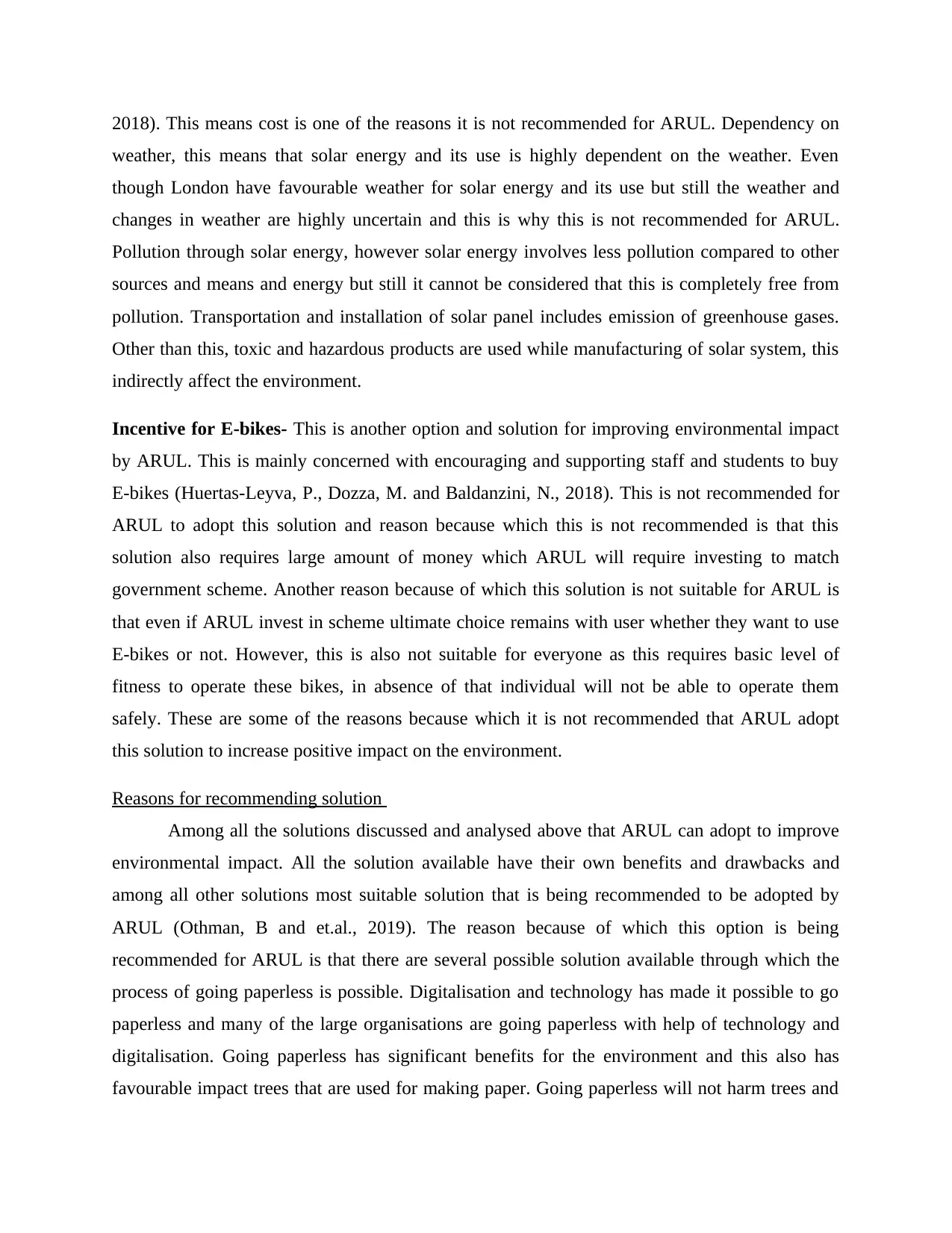
2018). This means cost is one of the reasons it is not recommended for ARUL. Dependency on
weather, this means that solar energy and its use is highly dependent on the weather. Even
though London have favourable weather for solar energy and its use but still the weather and
changes in weather are highly uncertain and this is why this is not recommended for ARUL.
Pollution through solar energy, however solar energy involves less pollution compared to other
sources and means and energy but still it cannot be considered that this is completely free from
pollution. Transportation and installation of solar panel includes emission of greenhouse gases.
Other than this, toxic and hazardous products are used while manufacturing of solar system, this
indirectly affect the environment.
Incentive for E-bikes- This is another option and solution for improving environmental impact
by ARUL. This is mainly concerned with encouraging and supporting staff and students to buy
E-bikes (Huertas-Leyva, P., Dozza, M. and Baldanzini, N., 2018). This is not recommended for
ARUL to adopt this solution and reason because which this is not recommended is that this
solution also requires large amount of money which ARUL will require investing to match
government scheme. Another reason because of which this solution is not suitable for ARUL is
that even if ARUL invest in scheme ultimate choice remains with user whether they want to use
E-bikes or not. However, this is also not suitable for everyone as this requires basic level of
fitness to operate these bikes, in absence of that individual will not be able to operate them
safely. These are some of the reasons because which it is not recommended that ARUL adopt
this solution to increase positive impact on the environment.
Reasons for recommending solution
Among all the solutions discussed and analysed above that ARUL can adopt to improve
environmental impact. All the solution available have their own benefits and drawbacks and
among all other solutions most suitable solution that is being recommended to be adopted by
ARUL (Othman, B and et.al., 2019). The reason because of which this option is being
recommended for ARUL is that there are several possible solution available through which the
process of going paperless is possible. Digitalisation and technology has made it possible to go
paperless and many of the large organisations are going paperless with help of technology and
digitalisation. Going paperless has significant benefits for the environment and this also has
favourable impact trees that are used for making paper. Going paperless will not harm trees and
weather, this means that solar energy and its use is highly dependent on the weather. Even
though London have favourable weather for solar energy and its use but still the weather and
changes in weather are highly uncertain and this is why this is not recommended for ARUL.
Pollution through solar energy, however solar energy involves less pollution compared to other
sources and means and energy but still it cannot be considered that this is completely free from
pollution. Transportation and installation of solar panel includes emission of greenhouse gases.
Other than this, toxic and hazardous products are used while manufacturing of solar system, this
indirectly affect the environment.
Incentive for E-bikes- This is another option and solution for improving environmental impact
by ARUL. This is mainly concerned with encouraging and supporting staff and students to buy
E-bikes (Huertas-Leyva, P., Dozza, M. and Baldanzini, N., 2018). This is not recommended for
ARUL to adopt this solution and reason because which this is not recommended is that this
solution also requires large amount of money which ARUL will require investing to match
government scheme. Another reason because of which this solution is not suitable for ARUL is
that even if ARUL invest in scheme ultimate choice remains with user whether they want to use
E-bikes or not. However, this is also not suitable for everyone as this requires basic level of
fitness to operate these bikes, in absence of that individual will not be able to operate them
safely. These are some of the reasons because which it is not recommended that ARUL adopt
this solution to increase positive impact on the environment.
Reasons for recommending solution
Among all the solutions discussed and analysed above that ARUL can adopt to improve
environmental impact. All the solution available have their own benefits and drawbacks and
among all other solutions most suitable solution that is being recommended to be adopted by
ARUL (Othman, B and et.al., 2019). The reason because of which this option is being
recommended for ARUL is that there are several possible solution available through which the
process of going paperless is possible. Digitalisation and technology has made it possible to go
paperless and many of the large organisations are going paperless with help of technology and
digitalisation. Going paperless has significant benefits for the environment and this also has
favourable impact trees that are used for making paper. Going paperless will not harm trees and
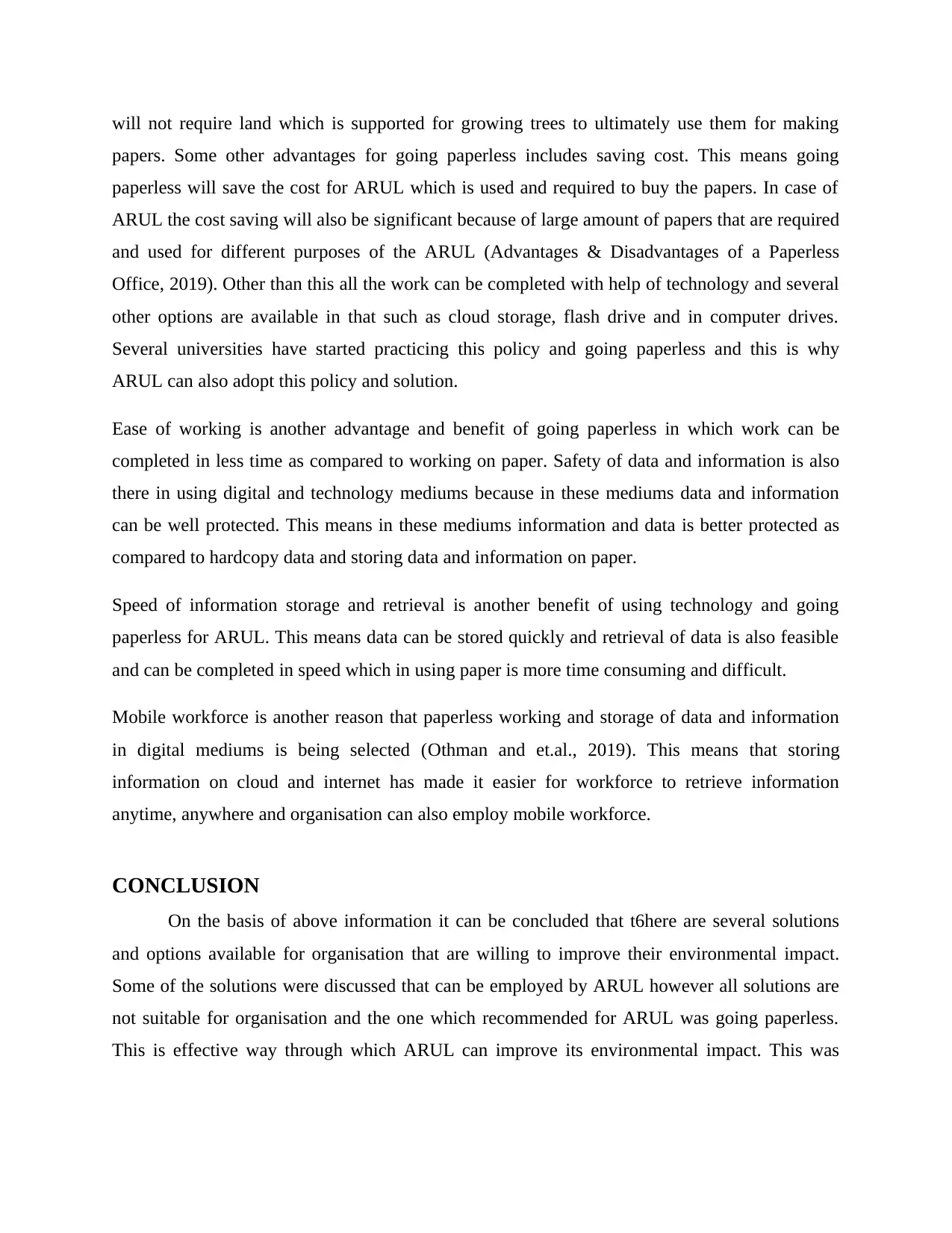
will not require land which is supported for growing trees to ultimately use them for making
papers. Some other advantages for going paperless includes saving cost. This means going
paperless will save the cost for ARUL which is used and required to buy the papers. In case of
ARUL the cost saving will also be significant because of large amount of papers that are required
and used for different purposes of the ARUL (Advantages & Disadvantages of a Paperless
Office, 2019). Other than this all the work can be completed with help of technology and several
other options are available in that such as cloud storage, flash drive and in computer drives.
Several universities have started practicing this policy and going paperless and this is why
ARUL can also adopt this policy and solution.
Ease of working is another advantage and benefit of going paperless in which work can be
completed in less time as compared to working on paper. Safety of data and information is also
there in using digital and technology mediums because in these mediums data and information
can be well protected. This means in these mediums information and data is better protected as
compared to hardcopy data and storing data and information on paper.
Speed of information storage and retrieval is another benefit of using technology and going
paperless for ARUL. This means data can be stored quickly and retrieval of data is also feasible
and can be completed in speed which in using paper is more time consuming and difficult.
Mobile workforce is another reason that paperless working and storage of data and information
in digital mediums is being selected (Othman and et.al., 2019). This means that storing
information on cloud and internet has made it easier for workforce to retrieve information
anytime, anywhere and organisation can also employ mobile workforce.
CONCLUSION
On the basis of above information it can be concluded that t6here are several solutions
and options available for organisation that are willing to improve their environmental impact.
Some of the solutions were discussed that can be employed by ARUL however all solutions are
not suitable for organisation and the one which recommended for ARUL was going paperless.
This is effective way through which ARUL can improve its environmental impact. This was
papers. Some other advantages for going paperless includes saving cost. This means going
paperless will save the cost for ARUL which is used and required to buy the papers. In case of
ARUL the cost saving will also be significant because of large amount of papers that are required
and used for different purposes of the ARUL (Advantages & Disadvantages of a Paperless
Office, 2019). Other than this all the work can be completed with help of technology and several
other options are available in that such as cloud storage, flash drive and in computer drives.
Several universities have started practicing this policy and going paperless and this is why
ARUL can also adopt this policy and solution.
Ease of working is another advantage and benefit of going paperless in which work can be
completed in less time as compared to working on paper. Safety of data and information is also
there in using digital and technology mediums because in these mediums data and information
can be well protected. This means in these mediums information and data is better protected as
compared to hardcopy data and storing data and information on paper.
Speed of information storage and retrieval is another benefit of using technology and going
paperless for ARUL. This means data can be stored quickly and retrieval of data is also feasible
and can be completed in speed which in using paper is more time consuming and difficult.
Mobile workforce is another reason that paperless working and storage of data and information
in digital mediums is being selected (Othman and et.al., 2019). This means that storing
information on cloud and internet has made it easier for workforce to retrieve information
anytime, anywhere and organisation can also employ mobile workforce.
CONCLUSION
On the basis of above information it can be concluded that t6here are several solutions
and options available for organisation that are willing to improve their environmental impact.
Some of the solutions were discussed that can be employed by ARUL however all solutions are
not suitable for organisation and the one which recommended for ARUL was going paperless.
This is effective way through which ARUL can improve its environmental impact. This was
⊘ This is a preview!⊘
Do you want full access?
Subscribe today to unlock all pages.

Trusted by 1+ million students worldwide

recommended for ARUL because it is an educational organisation and paper are used extensively
and going paperless will contribute in improving environmental impact of ARUL.
and going paperless will contribute in improving environmental impact of ARUL.
Paraphrase This Document
Need a fresh take? Get an instant paraphrase of this document with our AI Paraphraser
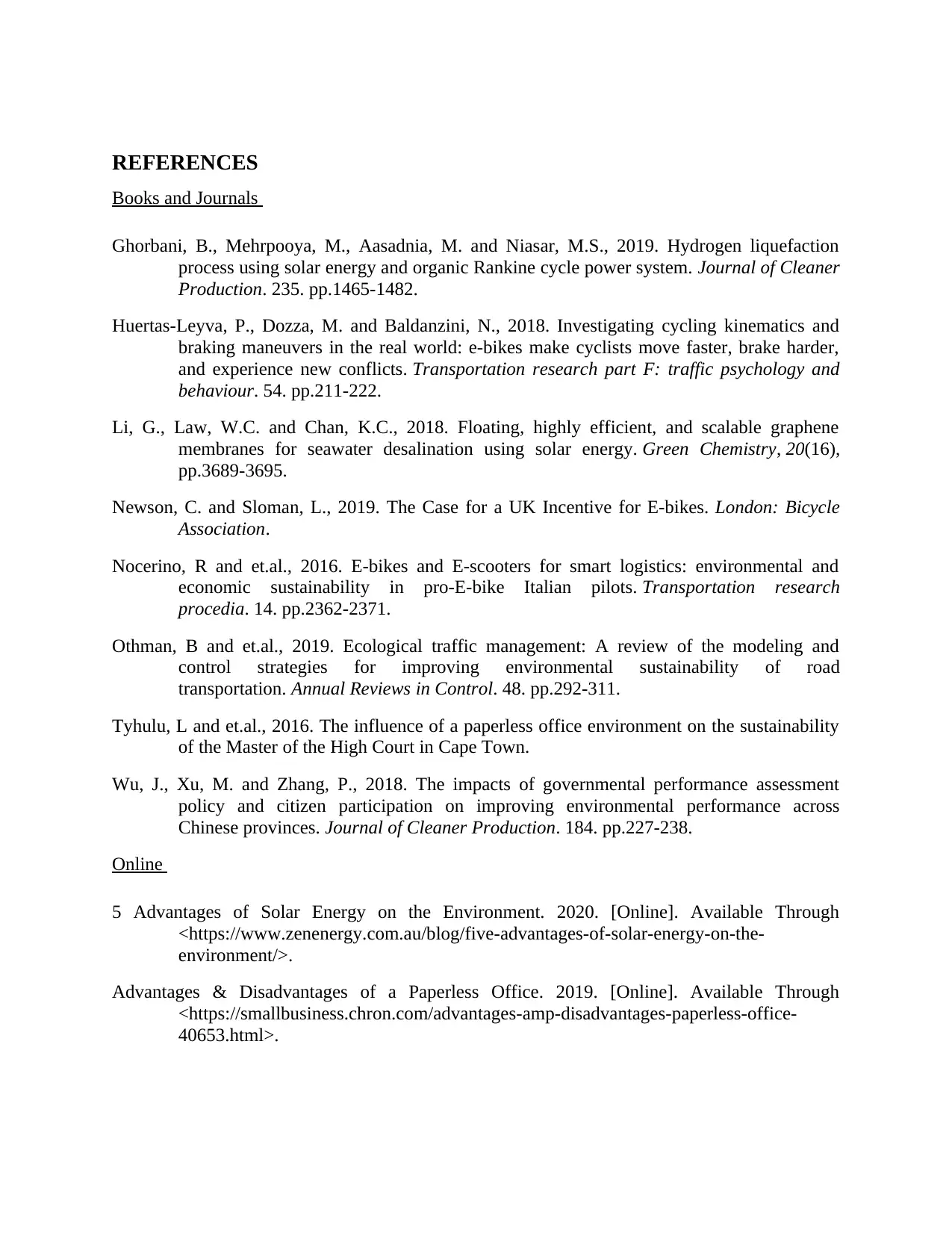
REFERENCES
Books and Journals
Ghorbani, B., Mehrpooya, M., Aasadnia, M. and Niasar, M.S., 2019. Hydrogen liquefaction
process using solar energy and organic Rankine cycle power system. Journal of Cleaner
Production. 235. pp.1465-1482.
Huertas-Leyva, P., Dozza, M. and Baldanzini, N., 2018. Investigating cycling kinematics and
braking maneuvers in the real world: e-bikes make cyclists move faster, brake harder,
and experience new conflicts. Transportation research part F: traffic psychology and
behaviour. 54. pp.211-222.
Li, G., Law, W.C. and Chan, K.C., 2018. Floating, highly efficient, and scalable graphene
membranes for seawater desalination using solar energy. Green Chemistry, 20(16),
pp.3689-3695.
Newson, C. and Sloman, L., 2019. The Case for a UK Incentive for E-bikes. London: Bicycle
Association.
Nocerino, R and et.al., 2016. E-bikes and E-scooters for smart logistics: environmental and
economic sustainability in pro-E-bike Italian pilots. Transportation research
procedia. 14. pp.2362-2371.
Othman, B and et.al., 2019. Ecological traffic management: A review of the modeling and
control strategies for improving environmental sustainability of road
transportation. Annual Reviews in Control. 48. pp.292-311.
Tyhulu, L and et.al., 2016. The influence of a paperless office environment on the sustainability
of the Master of the High Court in Cape Town.
Wu, J., Xu, M. and Zhang, P., 2018. The impacts of governmental performance assessment
policy and citizen participation on improving environmental performance across
Chinese provinces. Journal of Cleaner Production. 184. pp.227-238.
Online
5 Advantages of Solar Energy on the Environment. 2020. [Online]. Available Through
<https://www.zenenergy.com.au/blog/five-advantages-of-solar-energy-on-the-
environment/>.
Advantages & Disadvantages of a Paperless Office. 2019. [Online]. Available Through
<https://smallbusiness.chron.com/advantages-amp-disadvantages-paperless-office-
40653.html>.
Books and Journals
Ghorbani, B., Mehrpooya, M., Aasadnia, M. and Niasar, M.S., 2019. Hydrogen liquefaction
process using solar energy and organic Rankine cycle power system. Journal of Cleaner
Production. 235. pp.1465-1482.
Huertas-Leyva, P., Dozza, M. and Baldanzini, N., 2018. Investigating cycling kinematics and
braking maneuvers in the real world: e-bikes make cyclists move faster, brake harder,
and experience new conflicts. Transportation research part F: traffic psychology and
behaviour. 54. pp.211-222.
Li, G., Law, W.C. and Chan, K.C., 2018. Floating, highly efficient, and scalable graphene
membranes for seawater desalination using solar energy. Green Chemistry, 20(16),
pp.3689-3695.
Newson, C. and Sloman, L., 2019. The Case for a UK Incentive for E-bikes. London: Bicycle
Association.
Nocerino, R and et.al., 2016. E-bikes and E-scooters for smart logistics: environmental and
economic sustainability in pro-E-bike Italian pilots. Transportation research
procedia. 14. pp.2362-2371.
Othman, B and et.al., 2019. Ecological traffic management: A review of the modeling and
control strategies for improving environmental sustainability of road
transportation. Annual Reviews in Control. 48. pp.292-311.
Tyhulu, L and et.al., 2016. The influence of a paperless office environment on the sustainability
of the Master of the High Court in Cape Town.
Wu, J., Xu, M. and Zhang, P., 2018. The impacts of governmental performance assessment
policy and citizen participation on improving environmental performance across
Chinese provinces. Journal of Cleaner Production. 184. pp.227-238.
Online
5 Advantages of Solar Energy on the Environment. 2020. [Online]. Available Through
<https://www.zenenergy.com.au/blog/five-advantages-of-solar-energy-on-the-
environment/>.
Advantages & Disadvantages of a Paperless Office. 2019. [Online]. Available Through
<https://smallbusiness.chron.com/advantages-amp-disadvantages-paperless-office-
40653.html>.
1 out of 8
Related Documents
Your All-in-One AI-Powered Toolkit for Academic Success.
+13062052269
info@desklib.com
Available 24*7 on WhatsApp / Email
![[object Object]](/_next/static/media/star-bottom.7253800d.svg)
Unlock your academic potential
Copyright © 2020–2026 A2Z Services. All Rights Reserved. Developed and managed by ZUCOL.





